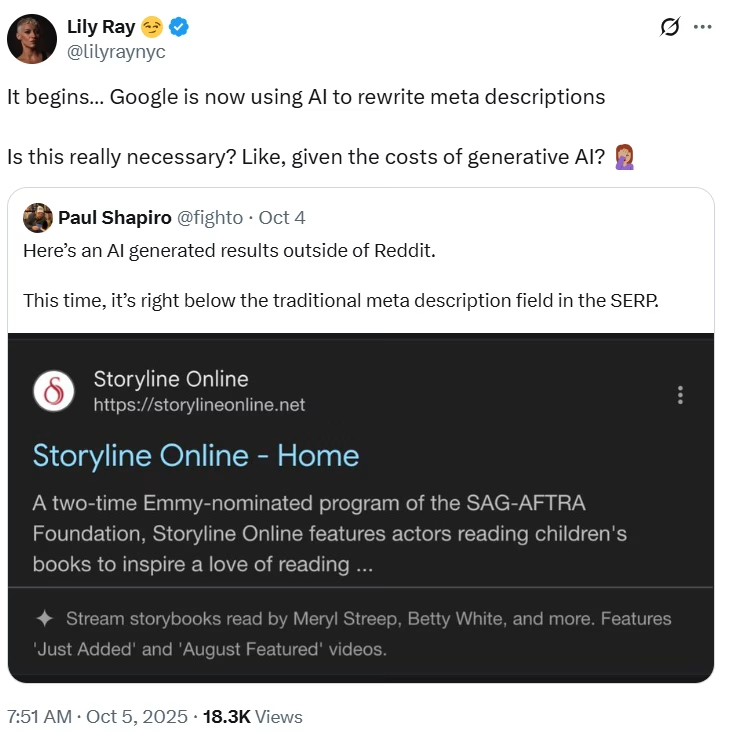Table of Contents


Want to Boost Rankings?
Get a proposal along with expert advice and insights on the right SEO strategy to grow your business!
Get StartedGoogle is testing a feature that replaces traditional search result snippets with AI-generated descriptions, raising fresh questions about accuracy, transparency, and control in online search.
Google’s latest experiment is stirring debate across the search and publishing community. Some users began noticing a small Gemini logo appearing beside rewritten search snippets.
Free SEO Audit: Uncover Hidden SEO Opportunities Before Your Competitors Do
Gain early access to a tailored SEO audit that reveals untapped SEO opportunities and gaps in your website.

The discovery, first flagged by SEO specialists Paul Shapiro and Brodie Clark on X, shows that Google is using AI to generate its own versions of these snippets, rather than relying on website-provided meta descriptions or extracted text.
WHOAH. This is an AI summary of the reddit thread in the description of a Google SERP.
I’m not seeing it on the linked page, meaning it’s likely generated by Google! Ref: https://t.co/AlD0A8MI1u pic.twitter.com/1meOOjVHvV
— Paul Shapiro (@fighto) October 1, 2025
SEO News: Google is now testing out a new type of AI-generated description for some pages. Is this the end of the meta description?
Instead of using a snippet of text from the page to generate the description, Google is generating the description itself based on the indexable… pic.twitter.com/PhYp51J1ok
— Brodie Clark (@brodieseo) October 2, 2025
The change might seem minor, but for publishers and SEO professionals, it touches one of the few areas where they’ve traditionally had some control over how their work appears on Google Search.
Replacing, Not Adding
Until recently, Google had been testing AI-generated summaries below the standard snippets. This new test goes a step further, replacing them entirely with AI-written text. Each instance carries the Gemini icon, signaling that the description was automatically generated.
Lily Ray posted on X:

Google has not issued a statement or documentation confirming the change. As with most of its experiments, the company appears to be running this on a limited scale before deciding whether to expand it.
A Quiet Redefinition of Search
Meta descriptions have served as the front line of a website’s presence on Google for decades. They don’t directly affect rankings, but they strongly influence engagement. Many site owners spend hours crafting them for clarity and appeal.
Now, that effort may soon be competing with Google’s own automated version.
The AI-generated snippets are meant to give users a concise and contextually accurate summary of what a page offers. But the idea of a machine deciding how to describe a webpage has raised alarms about accuracy and intent. If a description misrepresents content, it could harm both reader trust and website traffic.
Why Google Might Be Doing This
AI-written snippets align with Google’s broader direction toward automation. Over the past year, the company has expanded its Search Generative Experience (SGE), which uses generative AI to summarize information directly in search results. The AI snippets could be an extension of that goal — streamlining search by giving users cleaner, faster answers.
In theory, these summaries could be helpful when websites lack clear descriptions or include outdated or repetitive content. They could also standardize quality across results, ensuring that even poorly optimized pages are represented clearly.
But that optimization comes at a cost. Generative AI models sometimes produce factual inaccuracies, or “hallucinations,” and lack the nuance that human editors provide.
What It Means for the Future of Search
The test hints at a possible future where AI takes a larger role in how search results are presented — not just ranking information, but rewriting how it’s framed. That could make search more efficient for users, but it also blurs the line between indexing and authorship.
Google’s broader use of Gemini AI in search has been met with both enthusiasm and scrutiny. While the company argues that generative AI can make results more useful, critics warn that it concentrates even more interpretive power in Google’s hands.
For now, the experiment appears small. But if history is a guide, Google’s quiet tests often foreshadow larger rollouts.
This also introduces a deeper question: should AI be allowed to describe information authored by humans, especially when that description influences which links users click?
What Publishers Can Do
Here are a few steps to prepare for this possible shift:
- Keep metadata accurate and current. Even if AI rewrites it, Google’s systems still read existing tags as input.
- Prioritize clarity. Ensure on-page content communicates its purpose clearly — vague or complex phrasing increases the risk of AI misrepresentation.
- Use structured data. Schema markup provides context that can guide AI-generated summaries.
- Track your listings. Regularly check how your pages appear in search and document any AI-generated descriptions.
- Stay informed. Engage with SEO communities that monitor Google’s tests for early signs of broader rollout.
Key Takeaways
- Google is testing AI-generated search snippets. The descriptions, marked by the Gemini icon, replace traditional meta descriptions entirely.
- The experiment was first spotted by Paul Shapiro and Brodie Clark. SEO experts shared screenshots of the new AI summaries on X.
- Publishers are losing control over how their pages are described. AI-written text may misrepresent or alter tone, especially for sensitive topics.
- Google has yet to comment publicly. The feature appears limited but signals deeper integration of generative AI into Search.
About the author
Share this article
Find out WHAT stops Google from ranking your website
We’ll have our SEO specialists analyze your website—and tell you what could be slowing down your organic growth.














